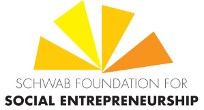 Claudio Sassaki and Eduardo Bontemp were announced yesterday as the winners of the 2014 Brazilian Social Entrepreneur of the Year Award during a ceremony at the São Paulo Museum of Art in São Paulo, Brazil.
Claudio Sassaki and Eduardo Bontemp were announced yesterday as the winners of the 2014 Brazilian Social Entrepreneur of the Year Award during a ceremony at the São Paulo Museum of Art in São Paulo, Brazil.- The finalists taking part in the ceremony provide an on-the-ground perspective on sustainability and social innovation in Brazil.
- Learn more about the Schwab Foundation for Social Entrepreneurship at www.schwabfound.org
São Paulo, Brazil, 3 December 2014 – The Schwab Foundation for Social Entrepreneurship, a sister organization of the World Economic Forum, in partnership with Folha de S. Paulo, announced Claudio Sassaki and Eduardo Bontemp as the winners of the Brazil Social Entrepreneur of the Year 2014 Award. The prize was conferred by Hilde Schwab, chair and co-founder of the Schwab Foundation for Social Entrepreneurship, and the 2013 Brazil Social Entrepreneur of the Year, Merula Steagall, in the presence of more than 400 leaders from the fields of business, the arts, civil society and academia.
The Schwab Foundation for Social Entrepreneurship works closely with Folha de S. Paulo, one of the largest media conglomerates in Brazil, not only for the awards ceremony but also for the search and selection process.
Claudio Sassaki and Eduardo Bontemp, Geekie
Geekie is a social business that has developed an adaptive learning platform that customizes students’ learning experiences by analysing their performance. Geekie’s flagship offerings are Geekie Games, a free online service that helps students prepare for the national college entry exams (Enem), and Geekie Teste, which provides online tests that act as a fast and efficient tool for diagnosis and management of school learning. In 2013, more than 17,000 schools (in all states) and students from 92% of Brazil’s municipalities participated in Geekie activities, thanks to the Geekie Games and partnerships with state departments. This makes 2 million registered users and 600,000 active users, 80% of whom were students in public schools (and 85% of whom were between 16 and 30 years of age).
More than 200 applicants entered the selection process for the 10th annual Brazil Social Entrepreneur of the Year and, after several stages of rigorous assessment of innovation, sustainability, direct social impact, influence on public policy, social entrepreneurship, reach, scope and ability to be multiplied – three finalists emerged. Second and third in the running were Hercilio Alexandre da Luz Filho from Fundação Pró-Rim and Paulo Roberto de Souza Moutinho from Instituto de Pesquisa Ambiental da Amazônia (IPAM).
The winner was selected by an independent panel of eminent judges, including Maria Cristina Frias, columnist and member of the board of Folha de S. Paulo; Cybele Oliveira, executive director and president of Chapada Institute for Education and Research; José Vicente, attorney and faculty dean of Zumbi dos Palmares; Antonio Moraes Neto, co-founder, Vox Capital; William Ling, director of the Ling Institute; Hilde Schwab, chair and co-founder of the Schwab Foundation for Social Entrepreneurship; Anna Maria Peliano, social scientist and researcher at the Instituto de Pesquisa Econômica Aplicada.
“During this special visit to Brazil, I have had the opportunity to meet key leaders in government, civil society and business, and I have been impressed with their interest and commitment to advancing social inclusion. It is clear that each sector has an important role to play in addressing some of the most intractable social and environmental issues; and social entrepreneurs, like those being recognized in Brazil, are an important part of the solution,” said Hilde Schwab.
The winner will be invited to join the Schwab Foundation’s global community of more than 250 Social Entrepreneurs. These innovators are driven by their mission to promote inclusive growth and push forward substantial social change by developing new products and services that benefit underserved communities.
More information about the finalists:
Hercilio Alexandre da Luz Filho, Fundação Pró-Rim
Currently the largest philanthropic organization in the field of nephrology in Brazil, Fundação Pró-Rim is a non-profit whose mission is to “save lives, focusing on the kidney patient” by providing multidisciplinary care and quality in haemodialysis, peritoneal dialysis and transplantation. With operations in the states of Santa Catarina and Tocantins, the organization conducts more than 56,000 outpatient treatments and 150,000 haemodialysis treatments a year, on top of the 1,200 kidney transplants they have carried out previously.
Paulo Roberto de Souza Moutinho, Instituto de Pesquisa Ambiental da Amazônia (IPAM)
Science and education for an “environmentally sound, economically prosperous and socially just Amazon” is the mission of IPAM, a scientific non-profit organization founded in Pará in 1995. With operations throughout the Amazon, it engages scientists and traditional populations in promoting sustainable development through participatory research. The result of this arrangement has benefited more than 100,000 people and gone beyond the forest with viable alternatives for mitigating global climate change.
About the Schwab Foundation
Co-founded in 2000 by Klaus Schwab, founder and executive chairman of the World Economic Forum, and his wife Hilde, the foundation has been identifying the world’s leading social entrepreneurs. It involves a community of over 250 award-winning social innovators who work in collaboration with corporations, governments and academic stakeholders. Social entrepreneurs selected by the Schwab Foundation are invited to participate in Forum events, which enables them to connect with leaders of business, politics and the media. http://www.schwabfound.org.
The World Economic Forum is an international institution committed to improving the state of the world through public-private cooperation in the spirit of global citizenship. It engages with business, political, academic and other leaders of society to shape global, regional and industry agendas.
Incorporated as a not-for-profit foundation in 1971 and headquartered in Geneva, Switzerland, the Forum is independent, impartial and not tied to any interests. It cooperates closely with all leading international organizations (www.weforum.org).
